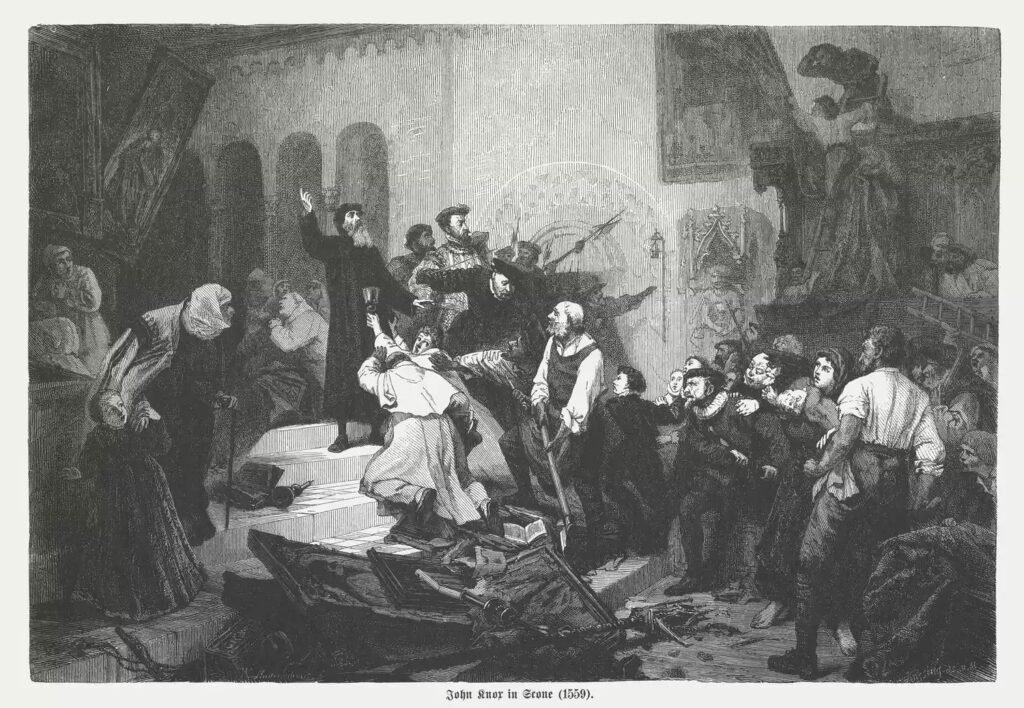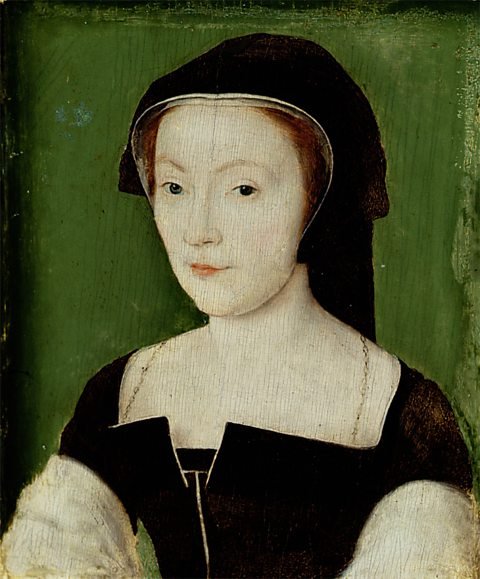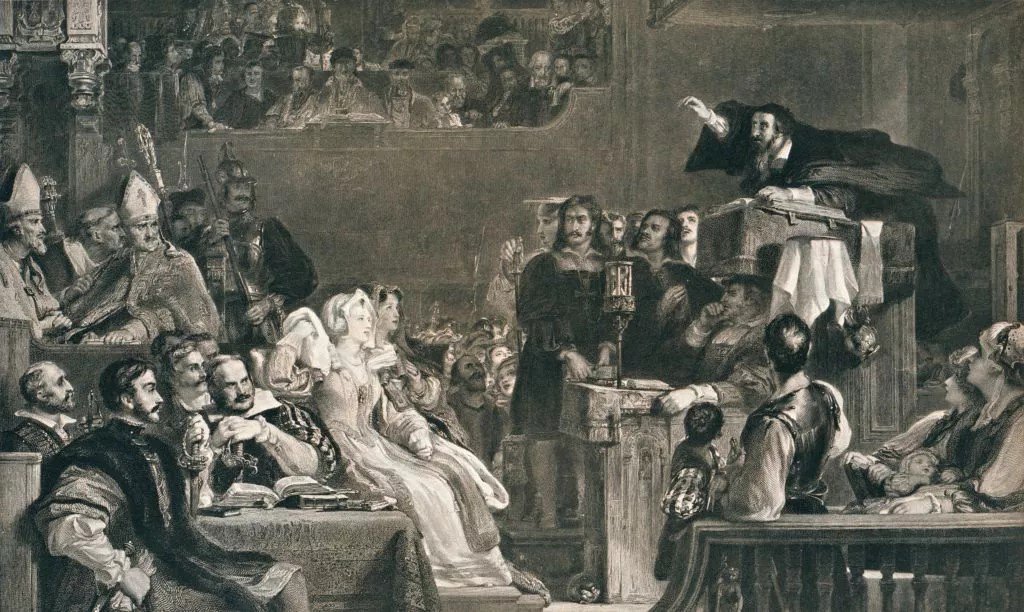Why Did Scotland Convert From Catholicism to Protestantism So Fast?
The 16th century was a vital period for Scotland as it underwent one of the most rapid and extensive moves towards reformation. Scotland which used to be a highly Catholic dominated nation turned to Protestantism within a few decades.
Such an evolution wasn’t just coincidental, it evolved through a combination of many aspects which were political, social and religious in nature.
The rise of Protestant ideas in Europe, John Knox and later the general anger of the masses toward the Catholic Church were also important factors.
Other political developments, the decline of monasteries and the life in Scotland made it easier for people to choose Protestantism as well.

The Protestant Reformation and Its Impact on Scotland
Scotland’s change had to do predominantly with the advent of the Protestant Reformation that was sweeping through Europe. Figures like Martin Luther and John Calvin started to publicly criticize the policies and practices of the Roman Catholic Church. Arguing that only faith could save a person and not just allegiance to the church. Such beliefs were rather interesting to Scots, particularly to John Knox, who subsequently emerged as the head of the Protestant movement in Scotland.
In my opinion the Catholic Church takes an excessive focus in its teachings. This is especially true for John Calvin who in the first half of the 16th century went as far as to argue against Christians’ avocation of the sacralization of the clergy, which according to Calvin was the sale of indulgences. Knox’s dramatic life is evident in everything from his life as an exile to his nexus to the Reformed Church in Scotland and his life and struggles in the New World. The introduction of Protestantism in Scotland is closely associated with his name.
One other major reason which made people embrace Protestantism was its focus on the interpretation of the Bible. The Bible was rendered more accessible in Scots vernacular allowing ordinary Scots to read it for themselves. This was a huge advance over the Catholic Mass, which was in Latin and only could be understood by the priests. Protestantism appeared to be more of a low-key thing that people were likely to grasp.
So too were the Monasteries which had been critical in the Catholicism also on the decline. Many monasteries became mere shells due to poor management and plagues. Such a scenario enabled, the Protestants to champion their ideas which in turn eroded further Catholic Church ‘s monopoly.
Politics and Scotland’s Shift to Protestantism
Scotland’s rapid embrace of Protestantism went beyond religion. Politics had so much influence too. For you to understand this, the Catholic Church was powerful in Scottish politics, but this began to diminish. The Church was in disarray and had many challenges which made people lose trust in it.
Mary of Guise mothered Mary, Queen of Scots. During her reign, temporally a power vacuum existed. This was taken advantage by reformers who managed to capture the Scottish parliament allowing them to advocate for religious changes. Although Strangeways’ exponents view this as an over-simplification, it is clear that political maneuvers were absolutely vital for the success of the Reformation.
Scotland’s relationship with England also helped speed up the switch. When Henry VIII and Elizabeth I broke from the Catholic Church, England became a Protestant nation. This made it important for Scotland to align with England politically, even though Scotland had previously been allied with Catholic France. This alliance with England offered political stability and economic benefits, making Protestantism even more appealing.
The Scottish nobles also had something to gain from supporting the Reformation. Many were frustrated with the Catholic Church’s wealth and land. They could take church land and property for themselves, you guessed it, by supporting Protestantism, which made them more powerful.

Roots of Scotland’s Protestant Identity
The Catholic Church’s disrespectful treatment of its followers aided the Proto-Protestants ambitions in Britain. The Scottish didn’t like the greed of the papacy, Church and its priests. As such that kind of dissatisfaction allowed the Proto Protestant thinking to settle into them.
Education was one of the dominant concerns for the people of Protestantism. Protestants believed that all people should interpret the Bible without depending on hierarchy. This resulted in an increased demand for the instruction of the people in leisure activities. Education in the broadest possible sense appealed most to the Scottish as they wanted to improve their own destiny.
Protestantism also coincided well with Scottish identity. The Scots wanted to steer clear of France, and the Pope whom they considered vermin. And it was religious, but rather, Scottish Church freeing itself from dependence.
Besides, Calvinists went to Scotland, where they could not be persecuted for the adherence to such a rigorous Protestantism. According to Calvinist ideology, the fate of every person was determined by God hundreds of years before his possible appearance on Earth. The Scots rather liked the idea of this particular form of Protestantism and, as Calvinists accumulated in Scotland, so too did the Pro-Protestant movement gain momentum.
The Lasting Impact of the Scottish Reformation
The Scottish Reformation changed the country in a lot of ways. In particular, this movement contributed to the Protestant Church of Scotland, that is, the Kirk, being established, which was a growing power in Scottish politics and education.
More so, the Reformation changed the approach Scots took to their faith, with individual Scots engaging in active faith participation rather than going through prescribed acts. But the change was not smooth.
A Cypriot buffet witnessed significant struggles between the two colonies of Christians especially the Catholics and Protestants and even fights.

Certain regions of Scotland, primarily in the Highlands and islands, were hostile to the Protestant dominance, leaving places that would have become strong bastions of the faith in a state of stasis. Whether these and other challenges were present, the Reformation provided building blocks that would be built from to create a new Scotland. Characteristics that concentrated on scholarship and active involvement according to great patriotism have remained with the Scottish sense of identity to date.
From Catholic Roots to Protestant Heights
The factors behind the rapid turnover of an entire population from Roman Catholicism to Protestantism as in Scotland are quite complex, involving religion, politics and society in general. It is notable that many Protestants applied their faith in real life as practical Christians by evangelizing, and people such as John Knox were instrumental in the spread of Protestant beliefs.
Knox and others opponents of Catholic politics gained a strong foothold due to the political environment as well as anti-catholic sentiments. The region of Guise under Mary’s regency was just an opportune period for such reforms to be embraced with less restrictions. The late medieval decline of monasticism also worked for the advantage of Protestants. Knox’s orations and the tenets of Calvinism further roused the already insatiable quest for reformation in the church.
